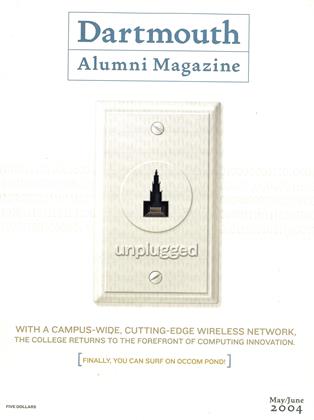> JOHN W. SCOTT '81: How his studentproject became part of rock history.
Among Deadheads, fans of the prolific you-get- it-or-you-don't jam band The Grateful Dead, analyzing set lists is almost as important as the music itself. For Scott that skill—knowing what song was played when, where, for how long, with what variations—blossomed into a career.
As author of Deadbase, an exhaustively detailed 596-page annotated compendium of the band's 2,318 shows, Scott became the Dead's semiofficial statistician. And Dartmouth is to thank, though not in the way you might think.
Sure, Scott, like 4,000 others, crammed into Thompson Arena 26 years ago this spring to see the Dead play the band's only New Hampshire concert (trust him) and Scott's first. Strolling through the cemetery back to the River Cluster, Scott knew he was hooked. "The music was like nothing else I had ever heard before," Scott recalls, "and I got it." Yet the show's true life-altering impact wouldn't be realized until six years later, when Scott—two years after graduation, a struggling Upper Valley artist—enrolled in some college computer science classes.
One assignment was to use mainframe language PL/I to write an application allowing specific queries of a huge batch of data. Scott typed in 500 Dead set lists starting with notes from 50-plus shows he attended. By the spring of 1984, Deadbase was born.
"I had always loved patterns and figuring how everything relates to each other," says Scott, a literature and creative writing major. "And the patterns that emerge can suggest new ways of thinking about the data itself." Though perhaps obscure, those patterns revealed how many times the Dead had played the rare song "Dark Star" in Berkeley on Tuesday nights. And that's exactly the kind of statistic tape-trading, tour-prone Deadheads wanted right at their fingertips. By 1986 Scott had convinced the Dead to rubber-stamp Deadbase as long as a percentage of sales went to charity. The book's first printing of 1,000 copies sold out immediately, and Deadbase was supporting Scott and his family.
He hasn't published a new edition of Deadbase since 1997 in part because the free-content Internet has made buying these stats somewhat unnecessary. Instead, he focuses on a new business, Dharma Rose, which offers T-shirts and candles at www.dharmarose.com and is run out of his home in Cornish, New Hampshire. He's also living proof that some coursework does pay off in the real world.
"Don't have a day job and then paint at night," he says. "Just paint. You may not be able to vacation in the Bahamas, but at least you'll be true to yourself."
 View Full Issue
View Full Issue
More From This Issue
-
 Cover Story
Cover StoryThe Great Disconnect
May | June 2004 By ED GRAY ’67, TU’71 -
 Feature
FeatureThe Defector
May | June 2004 By Matthew Mosk ’92 -
 Feature
FeatureYou Can’t Always Give What You Want
May | June 2004 By ALICE GOMSTYN ’03 -
 Feature
FeatureAmazing
May | June 2004 By Cynthia-Marie O'Brien '04, CHRISTOPHER BERG '89 -
 Article
ArticleNewsmakers
May | June 2004 By MIKE MAHONEY '92 -
 Sports
SportsStraight Shooter
May | June 2004 By Ed Gray ’67, Tu’71
C.J. Hughes ’92
-
 Article
ArticleHALLS OF NAME
Jan/Feb 2008 By C.J. Hughes ’92 -
 Feature
FeatureZoology
MAY | JUNE 2014 By C.J. Hughes ’92 -
 Feature
Feature“He Was My Brother”
NOVEMBER | DECEMBER 2020 By C.J. Hughes ’92 -
 PURSUITS
PURSUITSFlight Control
JULY | AUGUST 2022 By C.J. Hughes ’92 -
 notebook
notebookRed Alert
NOVEMBER | DECEMBER 2022 By C.J. Hughes ’92 -
 notebook
notebookFunny Business
NOVEMBER | DECEMBER 2023 By C.J. Hughes ’92







